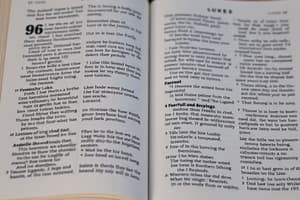Podcast
Questions and Answers
What type of binding is commonly used for softcover books?
What type of binding is commonly used for softcover books?
- Hardback
- Wire Coil Binding
- Spiral Binding
- Perfect Binding (correct)
Which binding method is suitable for large quantities of documents requiring frequent updates?
Which binding method is suitable for large quantities of documents requiring frequent updates?
- Coil Binding (correct)
- Hardbound Books
- Spiral Binding
- Saddle Stitching
What is a characteristic of hardbound books?
What is a characteristic of hardbound books?
- They are ideal for short runs of documents.
- They use plastic-coated wires for binding.
- They are associated with academic or professional publications. (correct)
- They have pages glued at the spine.
Why is spiral binding best suited for technical manuals or reports?
Why is spiral binding best suited for technical manuals or reports?
Which type of binding involves folding the booklet in half before sewing it together along the spine?
Which type of binding involves folding the booklet in half before sewing it together along the spine?
What role does the cover of a book play in enticing young readers?
What role does the cover of a book play in enticing young readers?
What design elements make the title pages of 'Dino Files' series easily recognizable?
What design elements make the title pages of 'Dino Files' series easily recognizable?
How do title pages help young readers engage with chapter books like 'Zoey and Sassafras'?
How do title pages help young readers engage with chapter books like 'Zoey and Sassafras'?
What visual representation does the title page of 'Diary of a Wimpy Kid' series use to attract young readers?
What visual representation does the title page of 'Diary of a Wimpy Kid' series use to attract young readers?
How does the title page contribute to making it easier for children to find books within a collection?
How does the title page contribute to making it easier for children to find books within a collection?
Flashcards are hidden until you start studying
Study Notes
Book orientation refers to the positioning and layout of pages in a book. It is crucial for ensuring optimal reading experience, maintaining structural integrity, and facilitating efficient printing processes. Here are some aspects related to book orientation:
Physical Orientation: Portrait vs. Landscape
Physical orientation can either be portrait mode, where taller pages are vertical and wider pages are horizontal, or landscape mode, where wider pages are vertical and shorter ones are horizontal. This choice impacts how people hold and turn the book while reading, which may affect their comfort level.
Spreads (Page Layout)
In a double page spread, two facing pages are printed on the same sheet of paper with one image or text continuing over the fold from one side to another. This format helps maintain continuity across pages and allows designers to play with visual elements like placement and texture.
Double Page Spread Problems & Solutions
One issue with double page spreads is that they can create difficulty when scanning through books because readers must flip nearly half the book back and forth. To overcome this problem, the book design may incorporate the concept of running heads, which are small versions of titles and captions that appear at the top of each page.
Another approach involves using digital tablets with two screens, allowing users to view both sides of the spread simultaneously without flipping pages. However, this solution requires additional investment from libraries and institutions.
Yet another alternative is designing books so that there's always a single column of text per page, reducing the need to have both columns on display at once.
Binding Types
Books can be bound various ways such as perfect binding, hardback, coil binding, saddle stitching, spiral binding, wire coil binding, plastic coil binding, and more. Each method has its own advantages and disadvantages.
Perfect Binding
Perfect binding is commonly used for softcover books. In this process, the pages are glued together at the spine, forming a crisp edge. It provides a clean look and makes it easy to open the book flat.
Hardbound Books
Hardbound books are often associated with academic or professional publications due to their durability. They consist of thick cardboard covers attached to the book block via adhesive or sewing threads. This type of binding adds weight and strength to the book.
Coil Binding
Coil binding is suitable for large quantities of documents needing frequent updates. A plastic coil holds the pages together along the spine, allowing them to lie completely flat when opened.
Saddle Stitching
Saddle stitching is ideal for short runs of documents. It involves folding the booklet in half before saddling and sewing it together along the spine.
Spiral Binding
Spiral binding is best suited for technical manuals, reports, or any document where multiple copies will be made. Punch holes along the binding, thread a spiral through these holes, and attach the cover.
Wire Coil Binding
Wire coil binding is similar to spiral binding but uses plastic-coated wires instead. This creates a smooth finish on the cover and reduces wear during handling.
Every binding method serves specific purposes based on what the reader needs from their book - whether it be portability, durability, ease of use, or cost-effectiveness.
Studying That Suits You
Use AI to generate personalized quizzes and flashcards to suit your learning preferences.




